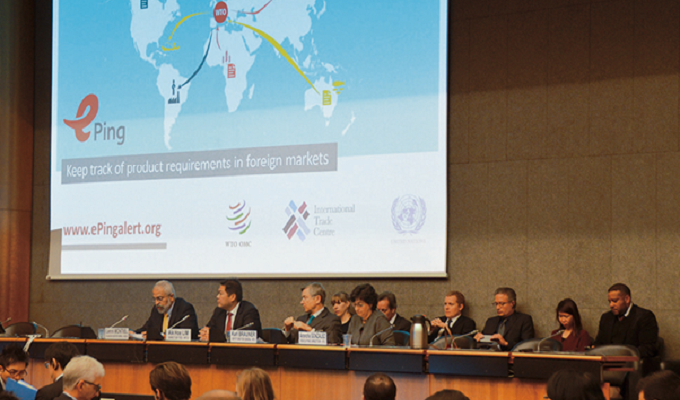

ePing: Cooperating to give SMEs real-time information about non-tariff measures (en)
For companies around the world, meeting technical regulations and product standards is an increasingly important part of doing business, whether internationally or at home. With manufacturing production increasingly fragmented across countries and regions, standards play a critical role in insuring that components made in one factory fit where they belong in another. Meanwhile, consumer expectations for product safety, quality and sustainability have steadily increased. ITC’s Market Access Map tool now counts more than 13,000 regulations and conformity assessment procedures that come under World Trade Organization (WTO) rules for Sanitary and Phytosanitary (SPS) measures and Technical Barriers to Trade (TBT).
The growing number of such non-tariff measures (NTMs) makes trading more complex, in particular for small and medium-sized enterprises (SMEs) in developing countries. These firms often struggle to make sense of the plethora of health and safety requirements, product regulations, testing and certification procedures and other such measures necessary for market entry.
ITC business surveys conducted in more than 60 countries
reveal that over 50% of the trade obstacles encountered by
businesses relate to SPS and TBT measures.
Meanwhile, the number of NTMs continues to grow. Each
year, governments notify the WTO of more than 3,500 TBT
and SPS measures, in line with transparency obligations for
policies that may affect international trade. The notifications
are supposed to give trading partners advance notice to
understand and comment on impending policy changes.
However, SMEs already struggling to cope with existing
NTMs are ill-equipped to digest these new flows of
information.
ITC joined hands with the United Nations Department of Economic and Social Affairs (UNDESA) and the WTO to set up ePing, an online alert mechanism for new SPS and TBT notifications. After signing up (registration is free), users receive daily or weekly alerts on new WTO notifications in sectors and markets of interest to them. SMEs are thus better equipped to share any concerns about prospective market requirements with their own national authorities and ultimately to understand and comply with measures that eventually enter into force.
More broadly, by enabling real-time debate on specific product requirements, the online tool supports timely and effective engagement among private sector and public stakeholders on SPS and TBT issues.
The ePing system complements ITC’s suite of online trade and market intelligence tools, which accessibly present data on trade, investment, tariffs, NTMs, private standards and government procurement. In addition to the real-time alerts, companies can use ePing to search for older SPS and TBT notifications for sectors and markets they operate in.
The resultsPrior to its global launch on 8 November, the ePing mechanism was tested in countries including Australia, Canada, Nepal, the Philippines and Uganda. User feedback has been positive, with government officials and business representatives praising the system for enhancing transparency around NTMs and enabling companies to prepare for policy change.
‘ePing is a useful platform for our exporters and stakeholders to readily access new trade challenges that affect their products and markets,’ said Nora Terrado, undersecretary for the Philippines’ Department of Trade and Industry. ‘This tripartite project has certainly improved accessibility and transparency on prevalent NTMs for SMEs participating in the global trade without additional costs to them.’
‘ePing provides timely information on technical regulations in fisheries for my members,’ added Ovia Katiti Matovu, head of the Uganda Fish Processors and Exporters Association and a user of the new system. ‘I am now able to receive and share information with my members on changes in technical regulations notified to the WTO, as well as to engage in discussions on the chat forum relating to various notifications of concern.’ She said that the mechanism made it easy for her to communicate about NTMs with members of the business association she leads.
The futureTogether with its partners, ITC will work to integrate ePing with other types of trade information and alerts. A key priority will be making the ePing system more accessible internationally, notably through partnerships with local institutions to translate the notifications into languages beyond English, French, and Spanish. Customized ePing interfaces could be built into national trade intelligence portals.



